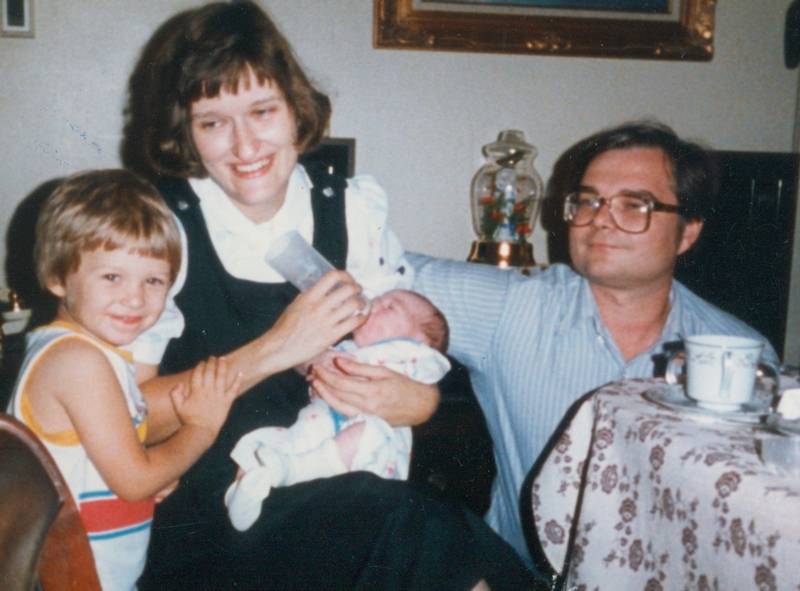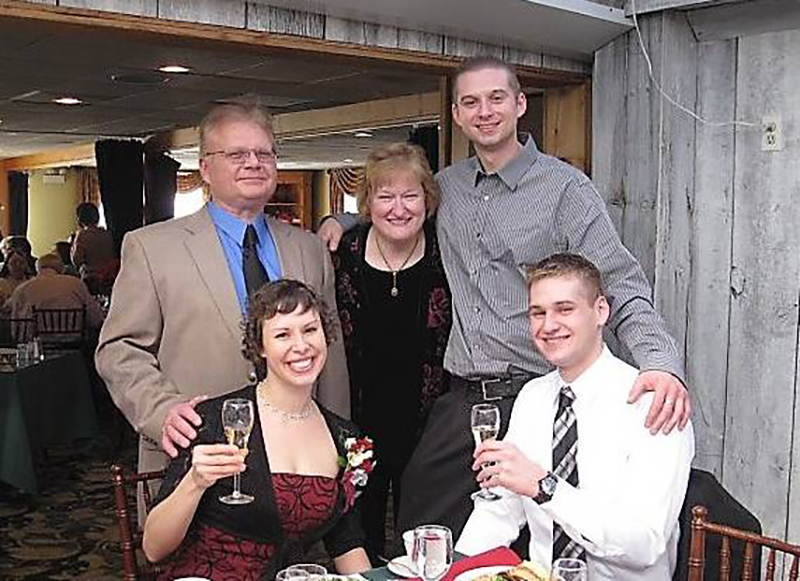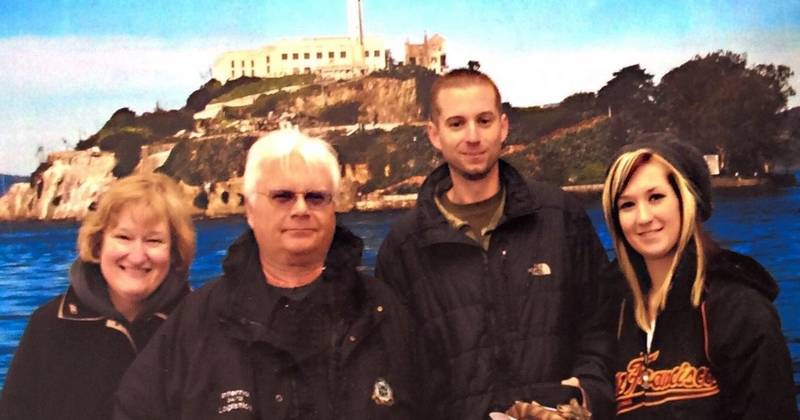

USE MENU ABOVE TO VIEW MORE IN THIS SERIES

Courtesy of The Such Family.
With oldest son Nicholas at her side, Janice Such feeds baby Danny while Joe Such looks on shortly after Danny's birth in 1985.
"Someday" is a word spoken with hope and wistfulness. It often found its way into conversations my husband, Joe, and I had around the dinner table.
Every night, we ate off our everyday plates, saving the china for someday special.
"Someday," we often said, "we will take that cruise that we have dreamed of. We'll do it after the kids finish school and after the mortgage is paid off."
With an apology in his voice, Joe would explain: "Someday, I won't have to work such long hours and we'll have more time to do the things we enjoy. When I retire, we'll get a little place, an A-frame cottage by a lake. We'll watch the sun rise and the sun set. There will be more time then, lots of time."
Someday was enough for us. After all, we were still relatively young. We could be patient.
Right before the holidays in December 2016, Joe said he wasn't feeling well. Suddenly, he couldn't swallow. He was hungry, very hungry, but he couldn't eat. After a few tests, he was diagnosed with esophageal cancer.
On New Year's Eve, our son and his family came over. Everyone put on black and silver New Year's hats and attempted to be festive. They knew something was wrong, so Joe told them his diagnosis. He thought that even if he couldn't be cured, he could live with his illness.
Joe's best treatment option was a serious operation known as esophagectomy. The plan was to remove the bottom of his esophagus and connect the remainder to his stomach. After treatment with chemo and radiation, he was supposed to have the surgery in March.
Sadly, the surgeon discovered his cancer had spread. Joe was no longer a candidate for surgery. Ever optimistic, Joe accepted another course of painful chemotherapy and radiation so he could get better.
Joe was strong, but the cancer was stronger, as determined to spread as Joe was to recover. One course of treatment followed another. Unfailingly, Joe was brave. He was stoic, continued to work and commuted more than an hour each way. I tried to get him to eat, but he couldn't. Over the course of a few months, he lost 80 pounds. Throughout the spring, we both held out for someday, which seemed farther away than ever.
Suddenly spring became summer, and a celebratory Father's Day beckoned -- a sliver of happiness we needed. Joe wanted our family to go to a resort in Wisconsin for the weekend. By his decree, our whole family was to go -- no excuses, no time conflicts, no prior commitments would be accepted.

Courtesy of The Such Family
Joe Such, in brown jacket, with, clockwise, wife Janice and sons Nicholas and Danny, welcome Kristen to the family at an engagement party in 2010.
Soon after arriving, we sat on the balcony and watched a lovely bride glide down the cobblestone path at the resort. Although she was a stranger, we toasted to her happiness and our own.
We were together. It was enough. Anyone who was old enough had a taste of champagne. Joe had ice water. Shortly after, we went down to the hotel dining room. The food was delicious, and Joe was able to eat a little tomato soup.
On this special golden night, I took a group photo. Joe said he wanted to go upstairs and rest while I paid the bill.
Suddenly, there was a disturbance in the lobby. Loud cries … people running … a scene forever frozen and etched in memory.
Joe had collapsed. Our son and daughter-in-law, former paramedics, worked feverishly on his chest. Even though they got him to breathe, he died three days later after more suffering than anyone should have to endure.
His bout with esophageal cancer ended on June 20, 2017, six months after the date of his initial diagnosis, six months into our 38th year of marriage.
Even though I knew Joe was sick, I had always held to the hope that "somedays" were still a possibility. He was so adamant that he wanted to live. Surely, the doctors, Joe and God would find a way.
The day after Joe died, his oncologist called. He shared that Joe faced his illness, with its many heart-shattering setbacks and disappointments, with grace and courage. I realize that doctors are schooled in what to say, but his words were heartfelt and true.
I have always believed in God and in His wisdom. Like others who have lost loved ones, I do not understand the reason for Joe's suffering. He was a good, hardworking man, and he died before so many of his dreams were realized.
I mourn the somedays that will never be; I regret the days I had with Joe that I did not treasure as much as I should have; I grieve over the many words I should have said but never did.
I am sorry for my children, who have lost a loving father; I feel sorrow that my precious grandson may not remember his caring granddad.
Every day, I miss my husband, and I wish that I were not so very much alone.
I falter at the difficult lessons that I am learning about new widowhood; my learning curve seems insurmountable at times. I want to be useful, and I want to be strong -- not for myself, but because I know that is how Joe would be if our roles were reversed.
People tell me that I need to let myself grieve and that each person's grief is unique. They say that healing is possible one day, but only achievable by facing the grief. Deep within, I know they are right.
I wrote this story of my husband's passing not only for people who have lost a spouse, but also for those who still have their loved ones.
The message is simple and sincere: Hold your loved ones close today because someday is a fleeting dream -- not a guarantee.
Do the things that bring you joy today. Buy the brightest, shiniest New Year's hats you can find and celebrate -- truly celebrate -- the blessings as well as the challenges of the year.
Use your best dishes and be your best self every day. Right now, love the most deeply and with the most passion and most gratitude you can muster. Today is all we have.

Courtesy of The Such Family
Janice and her history buff husband, Joe Such, tour Alcatraz with son Nicholas and daughter Laura Ashley during a visit to San Francisco in 2010.
These are some introductory lessons I have learned since my husband's death. There will be many more lessons to learn, I know, because I am a novice widow.
No well-meaning words can take the pain away. Words have always been my friends, but I now realize that they only wash over grief; they cannot take it away. That persistent grief comes back in strong and unexpected ways. I am so grateful for the people who reach out; I understand why others hesitate. I appreciate a warm hug or the squeeze of a hand; that human contact reaches me in ways that words cannot.
So, the first lesson I learned as a widow leads to an apology. I am so sorry for the times that I did not know what to say to people who had lost loved ones. I know that there were times when I did not say anything when I should have. There were other times when I offered a platitude like "he's in a better place" or "time heals all wounds." Now I know better.
My husband is not coming back. More than a month -- that's the time that it took for the sad reality to sink in. His loss is not a cruel dream; it is an absolute.
When I return home, sometimes I expect to see his Jeep. Secretly, I hope that maybe he got home early and started dinner for me. But the house is always empty, and the stove is cold. Making food and sharing it with the family was a way we used to show love. Joe will never make Sunday morning pancakes again. So, I eat, but the food does not taste the same without someone to share it.
I need to be part of the world, so I must reach out. It is hard, but it is necessary. Friends, family and acquaintances are busy because they are grappling with their own problems; their distance does not stem from a lack of compassion or kindness.
When they ask about my weekend, they do not realize that it is a question that pains me. Weekends are not what they used to be.
The good news is that there are people who are willing to help. There are bereavement groups sponsored by hospitals and places of workshop. Pastors, chaplains, grief counselors and caring volunteers are there to help those in need. Find a place where you feel welcome … a place where you can speak if you want and just listen if that is all you are able to do. Have hope that you find healing and grace in the necessary journey of grief, which each of us must travel.
Our loved ones do not want us to cling to sorrow or give up on life. Joe desperately wanted to live, and he made a herculean effort to survive. He did it for us. My husband would want our family to be happy.
If I learned anything about Joe over the course of our marriage, it is that he would want our lives to be filled with friends, family and hope for the future. By the same token, I want to remember him in happier times when he was a strong and vibrant man who could enjoy life.
Recently, I read that it is good for widowed people to think about their spouses happy in the next life. As a Christian, I imagine Joe in heaven, free of his suffering. I envision him reveling in all the wisdom and joy that heaven brings; he is doing what he loved to do on earth.
Fixing things was one of his favorite activities. Often, I wonder what he can fix in heaven because it is perfect; my children said that maybe he is sending his light and prayers to someone on earth who is in need of fixing -- maybe one of us.
I can do what needs to be done. I never realized all the things that Joe did to keep our house running. Now I am the one who must pay the bills and pull the weeds. There are many of both.
Sometimes I worry that others will notice that the house doesn't look as well kept as it used to; the corners do not shine as they once did.
But I know that Joe would smile if he saw our daughter cutting down a fallen, storm-damaged tree with power tools; he would be proud to see our son hauling away those heavy branches so his mom did not have to drag them. Joe would be pleased that our children gently laid mulch over soil in the garden that he loved so much.
We are doing the best that we can, and that is all that he would ask from us.

All loss is difficult. But few losses are as devastating or as challenging as the loss of life’s partner. Join us as we explore this unusually personal topic with first-person accounts and through the story of one family's tragic loss.